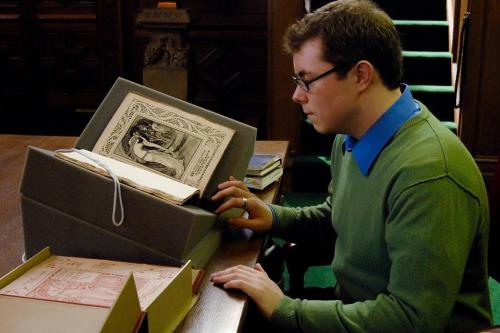Areas of Strength
American Literature and Culture
The area of strength in American Literature and Culture offers students the opportunity to research and write in an array of Americanist fields and periods from the colonial era to the present, including African American, Asian American, and U.S. Latinx literary and cultural studies,19th-century literature and culture, disability studies, gender/sexuality/LGBTQ studies, and 20th-century and contemporary literatures and cultures. American Literature and Culture takes a hemispheric view of “American." This means understanding the term not only as signifying writing, film, and music from the United States but from the greater Americas as well. Students with interests in Caribbean, Pacific, borderlands, Canadian, and Latin American literatures and cultures can thus study those traditions here in view of their diasporic and transnational aesthetics, histories, and politics. Faculty in American Literature and Culture have strengths in literary history, genre studies, and cultural and critical theory, making the area a prime one for making connections with other fields in literary and cultural studies in the department and beyond.
British and Postcolonial Studies, 1700–Present
The area of strength in British and Postcolonial Studies spans the field of modern British literature and culture post-1700, often with attention to questions about Empire and its aftermath. It has especial strengths in gender in British Literature, 18th-century literature of the British Empire, social history, aesthetics and photography, 19th and early 20th-century British literature and the visual arts, and colonial and postcolonial literature and cinema.
Seminars often focus on special topics as well as surveys of literary and cultural themes in the field of British and Postcolonial Literature and Culture. Graduate courses engage a theoretically and historically attentive approach to a wide range of materials, both canonical and non-canonical, in literature as well as visual culture. Seminars often complement and connect with those offered in the Medieval and Early Modern Studies and American Literature and Culture areas through theoretical intersections around transnational approaches and the analysis of gender and race.
Crip/Queer Studies
The doctoral program in English at GW identifies Crip/Queer Studies as one of its primary areas of strength and invites applications focused on that area of strength. All students receive tuition remission, a monthly stipend, active mentorship in teaching, research and publication, and the opportunity to develop an independent research program with our internationally recognized faculty.
Our interdisciplinary seminars explore the intersections of marginalized embodiments (disability, sexuality, transgender, race, class, age) and their rigorous analysis within cultural, historical, literary and media contexts. We also focus on embodiment in relationship to economic, environmental, cross-species, as well as organic and inorganic interactions. Specialties include representation, media and communications, memoir, trauma studies, globalization, cross-cultural studies, body theory, political economy, history, narrative theory, medical humanities and art, among others. Students are actively mentored in research, pedagogy and professionalization. The program also operates through collaboration with other GW programs that include Crip/Queer Studies researchers, such as The Writing Program, Philosophy and Women’s Gender and Sexuality Studies.
Medieval and Early Modern Studies
The area of strength in medieval and early modern studies was formed to take advantage of university-wide faculty strengths in these areas, as well as the rich resources for research available in Washington DC—most notably, the Folger Shakespeare Library, the Dumbarton Oaks Research Library and the Library of Congress.
Seminars focus upon the transnational and postcolonial aspects of England and Europe. Special topics courses and surveys of literary and cultural themes are also offered. Graduate seminars examine a wide range of materials both canonical and non-canonical. Students are also expected to take some of their coursework through the Folger seminar series.
The English Department houses the GW Medieval and Early Modern Studies Institute. The Institute sponsors frequent events and focuses upon early Europe within a transnational, theory-savvy frame.
Faculty members who regularly teach in the graduate program share many interests and have published widely.





